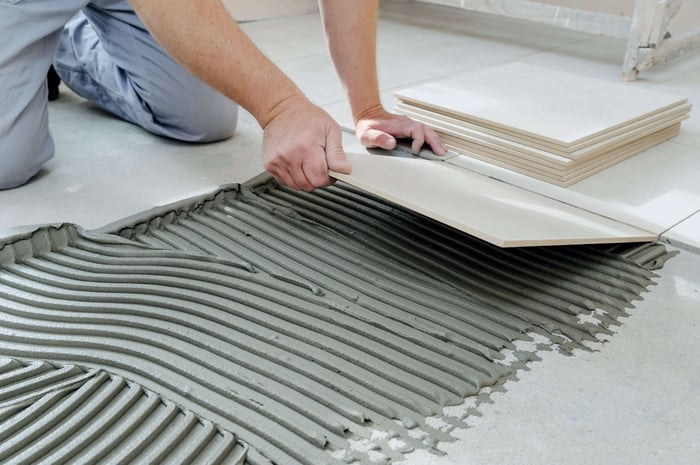
Porcelain Tile: Advantages and Disadvantages
Porcelain tile offers a number of benefits over other flooring options. Let's take a look.
Porcelain Tile Advantages
Durability
Porcelain is known for its strength and durability. It is resistant to wear, making it ideal for high-traffic areas. The PEI (Porcelain Enamel Institute) rating can indicate the suitability of porcelain tile for a particular type of use, with higher numbers indicating greater resistance to wear and tear.
Low Maintenance
Porcelain is known for being low maintenance, as it is resistant to stains, water, and other types of damage. It is easy to clean, and spills can be spot-cleaned with a damp rag.
Design Options
Porcelain tiles come in a wide range of styles, colors, and sizes, making it easy to find the perfect tile to match your design preferences. Porcelain can also convincingly mimic traditional flooring materials like wood, marble, and granite.
Resistance to Moisture
Porcelain tiles are known for their water resistance, making them ideal for wet areas like kitchens and bathrooms. The density of porcelain makes it more resistant to water penetration than other, more porous types of ceramic.
Resistance to Heat and Chemicals
Porcelain tiles are also resistant to heat, rust, and water. They are also nonreactive with chemicals, making them ideal for use in high-traffic commercial areas.
Now let's take a look at the potential downsides of having porcelain tile at home.
Porcelain Tile Disadvantages
Grout Lines
While porcelain tiles themselves are nearly impossible to stain, damage, or penetrate, the grout lines between tiles can be vulnerable. Grout is a porous material and needs to be sealed to prevent damage from regular use. Regular maintenance and cleaning can help to prevent discoloration and mold.
Cold to the Touch
Porcelain tiles can feel cold underfoot, especially in cooler weather.
Hard Surface
Porcelain tiles can be hard and unforgiving, leading to discomfort if standing or walking on them for extended periods of time.
Smooth Texture
Porcelain tiles can be slippery, especially when wet, which can be a safety hazard.
Sound Amplification
The hard surface of porcelain tiles can amplify sounds, leading to echoing in rooms with high ceilings or large open spaces.
Need for Additional Coverage
To mitigate the cold and hard surface, rugs or mats may need to be used, which can be an added expense and maintenance issue.
Multi-step Installation
Installing porcelain tiles can be difficult and requires some level of expertise and skill, especially if you're installing them on a large surface area. It requires proper planning and preparation, including measuring the surface area, cutting the tiles, laying out the tiles, mixing and applying the adhesive, and grouting.
Mistakes during the installation process can result in uneven tiles, lippage (when one edge of a tile is higher than another), or grout lines that are too wide or too narrow. It is recommended to hire a professional installer if you're not experienced in tile installation.
When making a decision to buy porcelain tile, it is important to consider other factors such as rectification, skid resistance, shade variation, and water absorption rates. There are several types of porcelain tiles available, including glazed, full body, and color body porcelain. Each type offers unique advantages and disadvantages, and it is important to consider the specific needs of your project when making a buying decision.
Be sure to consult a professional flooring specialist for advice on the best type of porcelain tile for your specific needs, and compare it with your other flooring options.



